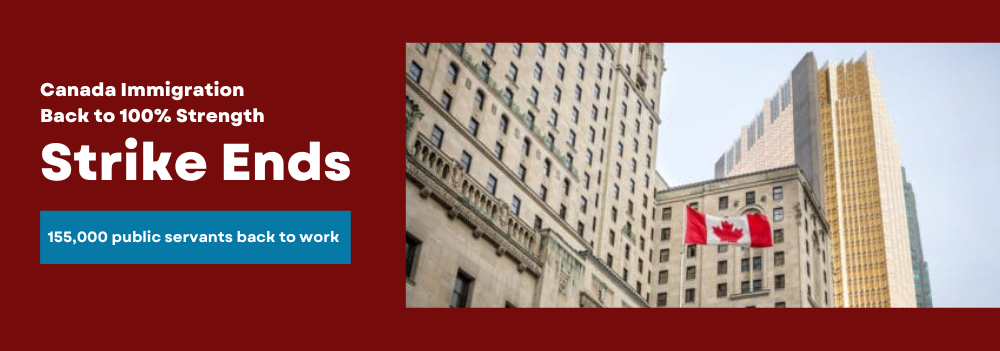Following a strike that affected over 155,000 public employees, including those at Immigration, Refugees and Citizenship Canada (IRCC), the Public Service Alliance of Canada (PSAC) and the Federal Government have tentatively reached an agreement.
On April 19, the strike got going. PSAC has given its members until 9 AM Eastern Time this morning, or until the end of their next available shift, to report back to work.
The provisional deal, according to PSAC, the union that represents the federal workers who went on strike, has advantageous measures for its members, including greater wages that will close the wage gap with inflation and new and improved language relating to working from home.
“There may still be some service impacts over the next few days and weeks as services return to full capacity,” the IRCC warns on its website.To keep you informed about how services are affected during the labour interruption, we will keep updating this website.
Throughout the strike, IRCC issued warnings that delays were anticipated in a number of areas, including:
IRCC can be reached by phone, email, or social media for assistance with processing applications in person, scheduling appointments, or occasions like citizenship ceremonies.
Access to Information Act requests regarding Canadian passport services
services for contributions and grants.
You might still submit an online application to the IRCC to extend your stay while on strike.
In addition, IRCC conducted its regularly scheduled Express Entry lottery last Wednesday and allowed an extra 3,500 applicants to submit applications for permanent residency notwithstanding the strike.
There have also been delays in the gathering of biometric data and the Temporary Foreign Worker Programme (TFWP), according to Employment and Social Development Canada (ESDC).
Employers who want to engage temporary foreign workers must submit Labour Market Impact Assessments (LMIAs), which are the responsibility of ESDC. Many Canadian employers rely on the TFWP to fill urgent job openings in high-demand industries as well as for seasonal workers.
Why did a strike occur?
Between February 22 and April 11, PSAC held nationwide strike elections. After further talks failed to result in an agreement, PSAC members decided to strike as of April 19 at 12:01 a.m.
The union said that by creating more jobs rather than outsourcing labour to for-profit businesses, it would be able to achieve its goals of equal pay, a better work-life balance, greater workplace diversity, and fewer layoffs.
Union members’ desire to carry on working remotely, as they had done throughout the COVID-19 pandemic, was one of the “deal breakers.” According to PSAC, public sector employees are just as productive working from home as they are in the office, and 90% of employees want to keep working from home.
While on strike, remote employees were required to walk the picket line.
The demands, according to the government, would have a significant negative impact on the provision of services to Canadians and would make it more difficult for it to manage personnel inside the public service.
In light of the elevated cost of living in Canada right now, the Union was also requesting increased compensation for its members.

